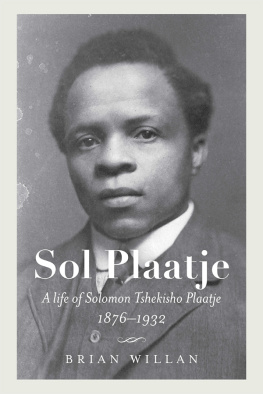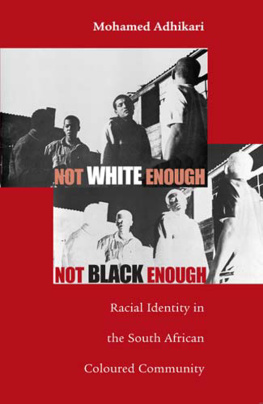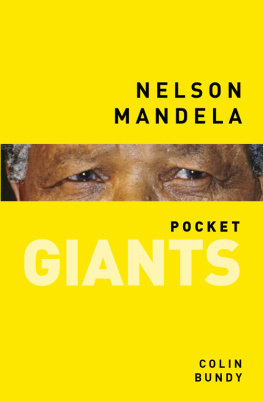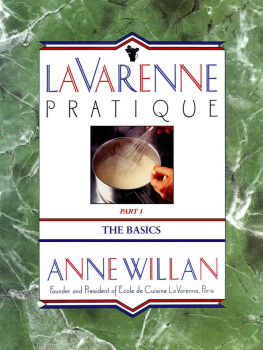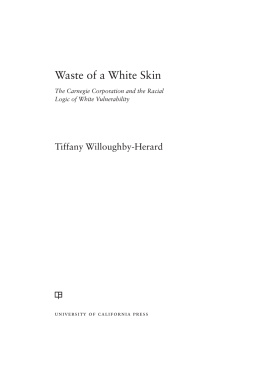Reconsiderations in Southern African History
Richard Elphick, Editor
Sol Plaatje
A life of Solomon Tshekisho Plaatje,
18761932
Brian Willan
University of Virginia Press
Charlottesville
University of Virginia Press
Originally published in 2018 by Jacana Media, South Africa. This edition of Sol Plaatje is published by arrangement with Jacana Media.
2018 by Brian Willan
All rights reserved
Printed in the United States of America on acid-free paper
First University of Virginia Press edition published 2019
ISBN 978-0-8139-4209-4 (paper)
ISBN 978-0-8139-4367-1 (ebook)
9 8 7 6 5 4 3 2 1
Library of Congress Cataloging-in-Publication Data is available for this title.
Cover image: This portrait of Plaatje was taken in late 1916 by Lizzie Caswall Smith (18701958), a fashionable society photographer, at her studios in Oxford Street, London. It was commissioned by The Christian Commonwealth, a weekly journal, and appears on the front page of its issue of 3 January 1917.
Editing by Russell Martin
Proofreading by Lara Jacob
Design by Shawn Paikin and Maggie Davey
Set in Ehrhardt MT 10.3/14
This book is dedicated to the memory of Tim Couzens (1940-2016), scholar and friend
List of abbreviations
| AMEC | African Methodist Episcopal Church |
| ANC | African National Congress |
| AS/APS | Anti-Slavery and Aborigines Protection Society |
| BMS | Berlin Mission Society, Berlin |
| BNA | Botswana National Archives, Gaborone |
| CAD | National Archives Repository, Pretoria |
| CMG | Companion, Order of St Michael and St George |
| DB | De Beers, Kimberley |
| DFA | Diamond Fields Advertiser |
| DSAB | Dictionary of South African Biography |
| HMV | His Masters Voice |
| ICU | Industrial and Commercial Workers Union |
| ILP | International Labour Party |
| IOTT | International Order of True Templars |
| KAB | Western Cape Archives and Records Service, Cape Town |
| KC | Kings Counsel |
| LMS | London Missionary Society |
| MFP | Molteno Murray Family Papers, University of Cape Town |
| NAACP | National Association for the Advancement of Colored People |
| NAD | Pietermaritzburg Archives Depot |
| OFS | Orange Free State |
| PSA | Pleasant Sunday Afternoon |
| SAIRR | South African Institute of Race Relations |
| SANNC | South African Native National Congress |
| SAP | South African Party |
| SGE | Superintendent General of Education, Cape Colony and Cape Province |
| SOAS | School of Oriental and African Studies, London |
| SSO | Southern Syncopated Orchestra |
| TAB | National Archives Repository, Pretoria (records of former Transvaal colony and province) |
| TLS | Times Literary Supplement |
| UCL | University College London |
| UCT | University of Cape Town |
| UM | University of Massachusetts, Amherst |
| UNIA | Universal Negro Improvement Association |
| Unisa | University of South Africa, Pretoria |
| USPG | United Society for the Propagation of the Gospel |
| UW | University of the Witwatersrand, Johannesburg |
| VAB | Free State Archives Repository, Bloemfontein |
| YMCA | Young Mens Christian Association |
List of illustrations
Photographs in text
Chapter 1:
Chapter 2:
Chapter 3:
Chapter 4:
Chapter 5:
Chapter 6:
Chapter 7:
Chapter 8:
Chapter 9:
Chapter 10:
Chapter 11:
Chapter 12:
Chapter 13:
Chapter 14:
Chapter 15:
Chapter 16:
Chapter 17:
Chapter 18:
Plate sections
I Between pages 104 and 105
II Between pages 168 and 169
III Between pages 264 and 265
IV Between pages 456 and 457
A note on terminology
A nybody writing on South African history has some tricky decisions to make regarding the use of terminology, particularly in relation to place names and the names given to African peoples.
On place names, I have generally adhered to contemporary usage, in line therefore with what was familiar to Sol Plaatje and reflected in his own writings: hence Bechuanaland for what is today Botswana, Basutoland for Lesotho, Rhodesia for Zimbabwe. Where place names have remained the same, but with slightly changed spellings, I have used modern variants: hence Mareetsane for Maritzani, Matobo for Matopo, Setlagole for Setlagoli, Mayakgoro for Majeakgoro. When quoting from historical documents, however, I have adhered to the original usage.
Mafeking, or Mafikeng (and, more recently, Mahikeng), which features prominently in this book, perhaps requires some further explanation. The name Mafeking, famous in the English-speaking world for its siege, was a corruption of the Setswana word Mafikeng, meaning place of stones. I use Mafikeng when referring to the original Barolong settlement, established well before the European township in 1885, or when I refer exclusively to the Barolong stadt, as it came to be known, after this date. I use Mafeking for the European town specifically, and on occasion to encompass the two together, as was Plaatjes practice too.
The names used for African peoples have varied over time in response to changing orthographies and changing politics, and there have often been tensions between linguistic correctness and popular usage. As with place names, I have left terminology unchanged when quoting from original documents, reflecting therefore the wide variations that existed when signifying both the Tswana people as a whole and individual Tswana chiefdoms (for example, Tswana, Chuana, Cwana, Bechuana, Bechwana, Baralong, Barolong). Otherwise, in the body of the text, I have retained African prefixes in line with common usage: hence, collectively, Batswana, Barolong (rather than Tswana, Rolong,), and, individually, Motswana, Morolong. For their language I have used Setswana, although when this is subsumed within a broader conception of people and culture together, and used as an adjective, I have reverted to Tswana. When referring to Nguni languages, I have preferred the more commonly used Zulu and Xhosa to isiXhosa and isiZulu just as I refer to German rather than Deutsch.
Today the term Kora is sometimes used for people formerly known as Korana (or Koranna). I have adhered to the term Korana, in line with the terminology used by both Plaatje and German missionaries, quoted in this book.
Finally, my use of the terms Dutch and Afrikaans. During the period I write about, the Dutch language in South Africa was in the process of becoming Afrikaans, but not in a unilinear manner, and usage and meaning varied according to context. Sometimes Dutch really meant Dutch, sometimes it was taken to mean its South African variant. Where necessary, and where possible, I have clarified.
Preface
O ne of the outstanding figures in the life of the people of South Africa: unveiling of tombstone on the grave of Solomon T. Plaatje: large and representative gathering at West End joins in impressive ceremonial. So ran the headline over a report in the
Next page
